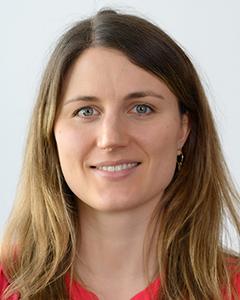
Dorota Szwarc-Hofbauer, MSc
Lecturer/Researcher
Leiterin des Stadt Wien Kompetenzteams Lehre Wissens-KnockIn
Ausbildung
- Seit 2017 | Doktoratsstudium, Molecular Mechanisms of Cell Biology, Medical University of Vienna & UAS Technikum Vienna
- 2013 – 2015 | Master of Science in Engineering (MSc) in Tissue Engineering and Regenerative Medicine, UAS Technikum Vienna
- 2009-2015 | Bachelor of Science in Engineering (BSc) in Biotechnology, Warsaw University of Life Sciences, Warsaw (PL)
Beruflicher Werdegang
- Seit 2015 | Junior Researcher/Lecturer, Department Life Science Engineering, UAS Technikum Vienna
- 2014 – 2015 | Research Assistant, Department Life Science Engineering, UAS Technikum Vienna
- 2012 – 2013 | Laboratory Assistant, Laboratory of Neurobiology, Nencki Institute of Experimental Biology, Warsaw (PL)
- 2012 | Intern, Laboratory of Molecular Biology, Institute of Biochemistry and Biophysics, Warsaw (PL)
Kompetenzen
- Zellbiologie
- Molekularbiologie
- Signaltranduktion
- Stoßwellentherapie
- Regenerative Therapien von Herzerkrankungen
- Mechanotransduktion